Increase knowledge! Besides eating jiaozi, you can still spend the Spring Festival like this.
Xinhuanet Beijing, February 14th (Wang Ying) In another day, we will usher in the long-awaited 30th anniversary. With the sound of firecrackers, the whole family is round and happy. As the most grand traditional festival of the Chinese nation, how do you spend your Spring Festival? Apart from eating jiaozi on holidays, how can we make the New Year taste and recall?
Clever hand-cut window grilles let the atmosphere of New Year flow naturally at home.
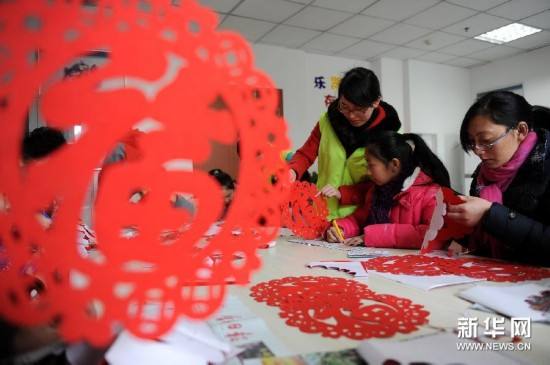
Before the festival, many families are busy preparing new year’s goods and buying new year’s gifts. In the new year’s goods, there are inevitably some festive objects that decorate the room, such as blessing characters, window grilles and auspicious pendants of the zodiac. In fact, in the past, there was no need to buy window grilles, and many families cut and pasted them themselves. On a square inch of red paper, a jubilant image was cut out.
"Window grilles" are commonly known as paper cutting. In the past, no matter the north or the south, stick grilles was used during the Spring Festival. Nowadays, people in the South usually only paste it when they get married, while the custom of stick grilles in the North during the Spring Festival is still prevalent in many places. Why do you want stick grilles for the Spring Festival? This is closely related to the solar terms in beginning of spring. Li Shangyin, a poet in the Tang Dynasty, once wrote in his poem: "Carving gold to win the praises of Jing and customs, and cutting green to create a Jin style for people." The "Jing custom" and "Jin style" in the poem point out this origin. After the Song and Yuan Dynasties, the time to cut and paste window grilles to welcome the Spring Festival was changed from beginning of spring, and people used paper-cutting to express their happy mood.
Window grilles not only set off the festive atmosphere, but also bring people beautiful enjoyment, integrating decoration, appreciation and practicality. Today, when DIY is advocated, if you are free, you might as well buy some red paper, try to cut small window grilles yourself, and decorate your home with skillful hands.
— — — — — — — — — — — — — — — —
Writing Spring Festival couplets to keep the whole family safe and happy.
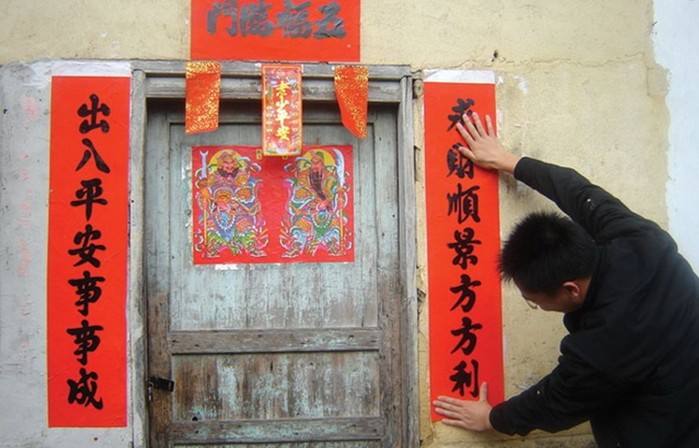
Like window grilles, in many families’ new year’s goods lists, there is also a Spring Festival couplets, and some exquisite families will also buy door gods. It’s a little more difficult for door gods to make their own self-control, but Spring Festival couplets can still try to write by themselves, which not only exercises calligraphy, but also improves the literary level.
Like window grilles, Spring Festival couplets have a history of thousands of years. According to the records of the Jade Candle Collection and Yanjing’s Chronicle, the original form of Spring Festival couplets is what people call "Taofu". In the Song Dynasty, people began to write couplets on the mahogany board, one of which did not lose the meaning of killing evil spirits, the other expressed their good wishes, and the third decorated the portal for beauty. Later, people wrote couplets on red paper symbolizing happiness and auspiciousness, and posted them on both sides of doors and windows during the Spring Festival to express people’s good wishes for good luck in the coming year.
In addition to Spring Festival couplets, many places also retain the custom of sticking to the door. In the folk, the door god is a symbol of righteousness and force. The ancients believed that people with strange looks often had magical temperament and extraordinary skills. They are honest and kind-hearted, and it is their nature and responsibility to catch ghosts and capture demons. Zhong Kui, the ghost hunter admired by people, is such a strange look. Because the doors of residential houses are usually two opposite, the door gods are always in pairs. After the Tang Dynasty, in addition to shentu and Yu Lei, people regarded Qin Shubao and Weichi Gong, two military commanders in the Tang Dynasty, as gatekeepers. Since then, the custom of taking these two famous men as door gods has begun to spread widely among the people.
— — — — — — — — — — — — — — — —
In the sound of firecrackers, we should say goodbye to the old year and welcome the new year.
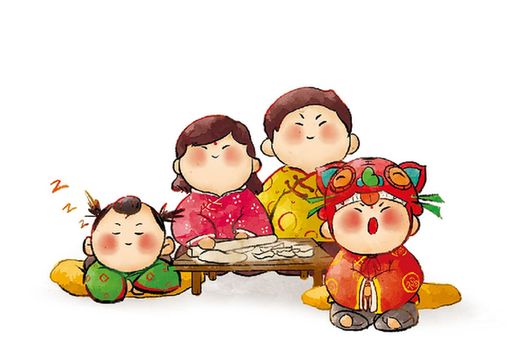
Watching the New Year’s Eve is an important folk custom in China, also known as wasting time, staying up late, which means family reunion on New Year’s Eve and staying up late to welcome the Lunar New Year. In ancient times, there were two meanings of observing the old age: the old people’s observing the old age means "resigning the old age", which means cherishing time; Young people keep their age to prolong the life of their parents. Since the Han dynasty, the time when the old and the new years alternate is generally at midnight. On New Year’s Eve, people of all ages, men and women, will be brightly lit and get together to watch the new year.
In the past, people used to have a New Year’s Eve dinner and spend a wonderful night together. Since the 1980 s, there has been a new content of observing the Spring Festival Gala: people all over the country watch it together. The Spring Festival Gala, which lasted more than four hours, was rich and varied, and people greeted the ringing of the New Year bell with laughter.
It is worth mentioning that Suzhou people have to wait for the loud bell coming from Fengqiao Hanshan Temple on New Year’s Eve. When the bell passes through the dark night and reaches thousands of families, it marks the arrival of the new year. No matter spring, summer, autumn and winter, the bell will ring in Hanshan Temple at midnight every day, which is called "Minute Night Minute" by the people.
— — — — — — — — — — — — — — — —
On New Year’s Eve, we should give the younger generation lucky money and hope that the children will grow up healthily, safely and happily.
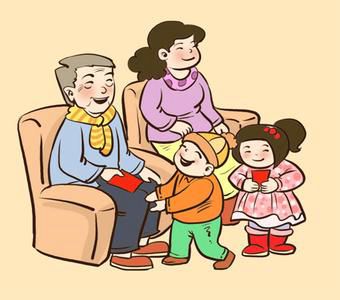
For children, the happiest thing during the Spring Festival is the lucky money from the elders. Year’s money, also known as "year’s money" and "year’s money", is one of the thrifty things in the old customs. The original intention of lucky money is to ward off evil spirits. People think that children are vulnerable to sneaky attacks. If you wrap money in red paper on New Year’s Eve, you won’t dare to harass them again. Therefore, people call this kind of money "precious money". Because "precious" and "old" have the same pronunciation, they are called "lucky money" for a long time. Use lucky money to overcome evil spirits, help children celebrate the New Year safely, and wish them good health and luck in the new year.
— — — — — — — — — — — — — —
From the first day to the sixth day, I will pay New Year greetings, return to my parents’ homes, and "drive the five poor"
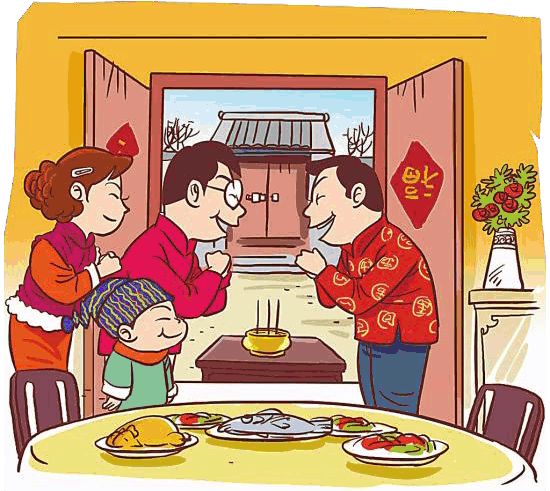
After New Year’s Eve, people ushered in a new year. In the past, from the first day of the first month to the fifteenth day of the first month, there were various holiday customs. With the changes of the times and the differences in different places, many customs have gradually faded away, and what remains is worth cherishing and inheriting.
On the first day of the first month, people usually set off firecrackers after getting up in the morning, which is called "opening the door to have a firecracker". After the sound of firecrackers, the ground is full of broken red, which is called "full house red" In many areas, children have to be dressed in new clothes on the morning of the first day. After everyone is dressed neatly, they will go out to visit relatives and friends, pay New Year greetings to each other and wish the New Year. When paying New Year’s greetings, the younger generation should first pay New Year’s greetings to the elders, wishing them a long and healthy life. The elders can distribute the lucky money prepared in advance to the younger generation. In many places, brooms and garbage are not put out on the first day of the first month of the first month, and a large bucket is prepared to hold waste water, and it is not spilled on the same day.
On the second or third day of the first month, for many families, it is the day when a married girl returns to her parents’ home with her husband, commonly known as "Welcome Husband Day". On this day, we will also visit relatives and friends and worship each other for the Spring Festival, commonly known as "eating New Year’s wine". In Shanghai, guests bring gifts to their homes with their families. Gifts are generally local specialties, and the host invites guests to drink "Yuanbao tea" (that is, two green olives are added to the tea to brew together). This tea tastes a little bitter at first, but has a sweet aftertaste, which means that it is good to make money through hard work.
On the fourth day of the third grade, because of different local customs, there are also differences in passing the law. By the fifth day of the fifth year, people will "drive the five poor", commonly known as "breaking the five poor", including "poor in intelligence, poor in learning, poor in literature, poor in life and poor in communication". After people get up in the morning, they set off firecrackers and clean up. Firecrackers are set off from the inside out, and as they are set off, they go outside the door, which means to drive out all unlucky things. Legend has it that this day is the birthday of the god of wealth, so it is also an auspicious day to welcome the god of wealth. Shanghai has the custom of grabbing the road head in the old calendar year. On the fourth night of the first month of the first month, prepare sacrifices, cakes, incense sticks and other things, and ring gongs and drums to burn incense for worship, and sincerely respect the god of wealth. In order to compete for the market, it is called "grabbing the road head" before the fourth day, also known as "picking up the God of Wealth".
— — — — — — — — — — — — — — — — — —
Jiaozi still wants to eat, but jiaozi in the 30 s is very different.
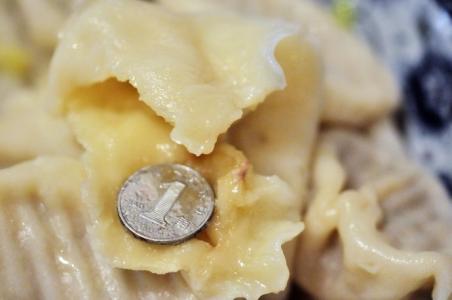
Nowadays, people are used to eating jiaozi in festivals and festivals. Although it’s nothing new to eat jiaozi during the Spring Festival, jiaozi at the age of 30 is very different. When wrapping jiaozi, in addition to various delicious fillings, people often wrap candied beans, peanuts, dates, chestnuts, coins, etc., which means good luck in the coming year. In some areas, when eating jiaozi, some non-staple food should be added to show good luck. If you eat tofu, it symbolizes the happiness of the whole family; Eating persimmon symbolizes all the best; Eating three fresh vegetables symbolizes the prosperity of three yang. In addition, many areas in the south do not eat jiaozi on New Year’s Eve, but choose to eat rice cakes or glutinous rice balls. Although the ingredients are different, the good expectations for the New Year are the same.
Why do you have to eat jiaozi during the Spring Festival, especially on the eve of the Lunar New Year? In fact, eating jiaozi means "making friends at a younger age", and "zi" means "zi Shi", which is homophonic with "jiao" and means "happy reunion" and "good luck". Generally, jiaozi in the 30′ s should be wrapped before 12 o’clock in the evening and eaten at midnight, because this is the beginning of the first day of the first lunar month. Happy new year!
— — — — — — — —
Times are changing, people’s ideas are changing, and the way of celebrating the Spring Festival is also changing. Nowadays, many traditional Chinese New Year customs are gradually forgotten by people, and some new Chinese New Year style, such as family trips and flying adventures in the world of ice and snow, have become many people’s choices. It is said that the taste of the year has faded, and there is nothing more special except eating jiaozi. In fact, the taste of the year is not weak, but what is weak is our choice. The Chinese New Year is coming soon. Follow these rich Chinese New Year customs and start a different kind of Chinese New Year with full atmosphere and deep connotation!